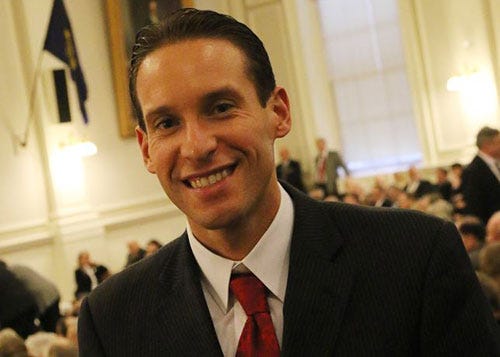Lawmaker: I have filed the strongest and most effective legislation in state history
A New Hampshire lawmaker has filed “the strongest and most comprehensive anti-drug bill in state history” AND “the strongest and most effective jobs bill in state history” – or so he says.
State Rep. Eric Estevez, a one-term Republican representative from Pelham, discussed his proposed legislation on Facebook.
The drug bill, which Estevez describes as the “most comprehensive anti-drug bill in state history,” would increase the penalty for the sale or possession of fentanyl, a powerful opioid that has surpassed heroin as the most common drug contributing to fatal overdoses in the state.
Current state law makes the possession of fentanyl, a Schedule II controlled substance, a Class B felony for the first offense and a Class A felony for subsequent offenses. Those convicted of trafficking face up to 7 years in prison for the first offense and up to 15 years for subsequent offenses.
Estevez says his bill “holds drug dealers that lace drugs with the deadly fentanyl ‘Accountable for their actions…’ This bill will not solve the heroin epidemic,” he wrote, ”but is a start in the right direction.”
Estevez’ jobs bill is as ambitious as his drug bill is underwhelming. Modeled after New York’s “Start-Up NY” program, the legislation he describes as the “most effective jobs bill in state history” would provide a ten-year exemption from the New Hampshire business profits tax for new businesses that relocate from out-of-state.
Businesses receiving the tax exemption would be required to provide state residents with preferential treatment in the hiring process, partner with a local college or university by providing internships and research opportunities and "practice ethical corporate social responsibility.”
Greg Moore, the state director for Americans for Prosperity who never met a tax cut he didn’t like, applauded Estevez for the effort but warned him it is likely unconstitutional. “[T]he NH Constitution requires that all taxes be ‘uniformly applied and broadly based,’ meaning that you couldn’t charge one type of business (new or relocated ones) a different rate than other businesses (established, existing ones),” Moore explained.
Colorful history
Estevez’ colorful history includes exaggerated credentials, a faked campaign photo, a phony endorsement and more than one allegation of vandalism. Earlier this year, he was involved in a fracas with Nashua Mayor Donnalee Lozeau that reportedly resulted in House Speaker Shawn Jasper directing Estevez to apologize in writing.
The Pelham representative’s legislative record has been less newsworthy. He was the prime sponsor for bills establishing a criminal penalty for falsifying information to obtain a protective order and increasing the minimum license revocation period for third and fourth driving while intoxicated offenses. Both bills were rejected by the House in voice votes after the Criminal Justice and Public Safety Committee turned them down in unanimous 16-0 votes.
Last month, Estevez was eloquent in his praise for the budget compromise passed by both chambers and signed into law by the governor. “The entire state budget debate reminded me of the 1980’s when Republican President Ronald Reagan and Democrat Speaker Tip O’Neil had respect for each other, put aside their differences, and had the political courage to compromise for the good of the people…” Estevez wrote. “Our state leaders did the responsible thing today and passed a budget. It was a victory for the people of New Hampshire.”
A subsequent comment from one of his fellow lawmakers pointed out that Estevez was one of 73 representatives who voted against the compromise budget.



